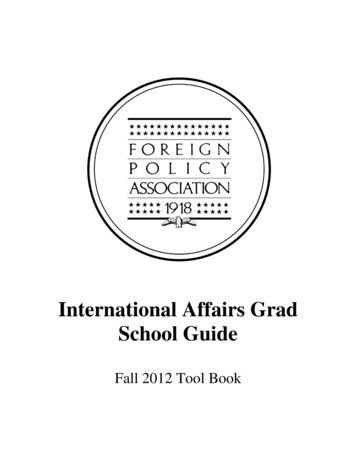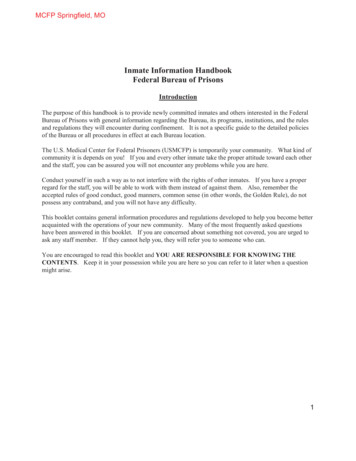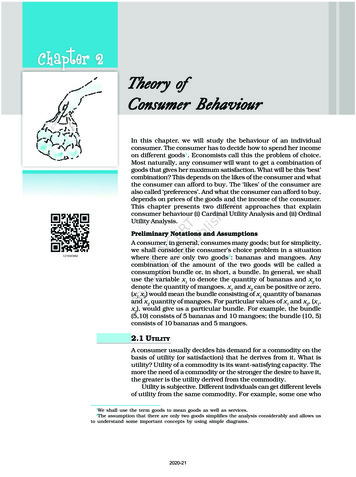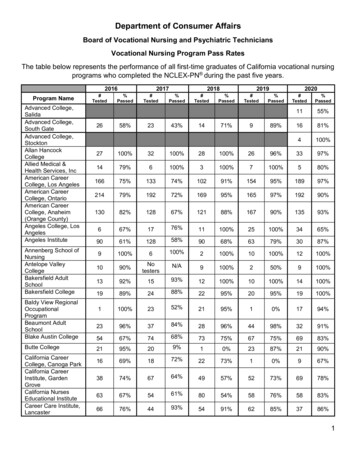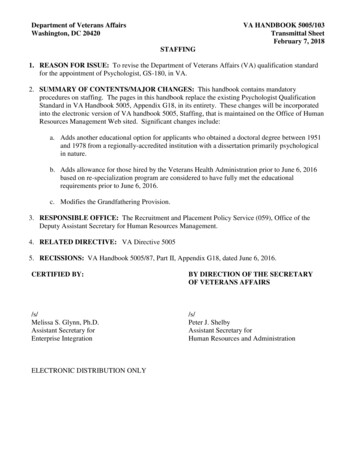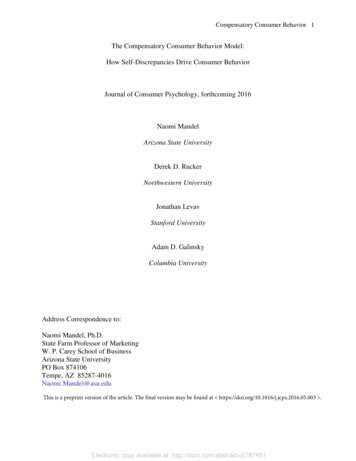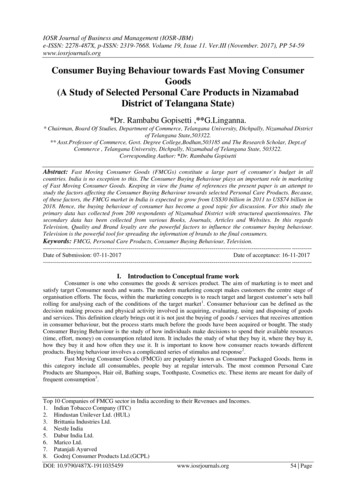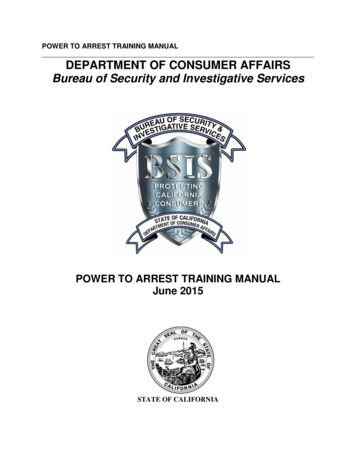
Transcription
POWER TO ARREST TRAINING MANUALDEPARTMENT OF CONSUMER AFFAIRSBureau of Security and Investigative ServicesPOWER TO ARREST TRAINING MANUALJune 2015STATE OF CALIFORNIA
POWER TO ARREST TRAINING MANUALPOWER TO ARREST TRAINING MANUALTABLE OF CONTENTSPageTable of Contents. 2-3Instructor/Employer Introduction and Training Requirements . 4-12Steps to Administering Power to Arrest. 13-16Responsibilities of the security guard/proprietary private security officer/employer . 17-18Part A. Role and Responsibilities of the security guard/proprietary private security officer. 19-211. Areas of Responsibility . 22-232. Prevention is the Key. 243. Observe and Report . 244. Get Help . 25Part B. Relations with the Local Police. 26-27Part C. Observation and Report Writing . 28-30Part D. Authority to Question and a Basis for Making Decisions. 31-33Part E. Inspections . 34-35Part F. Legal Responsibilities and Liabilities . 36-40Part G. Factors to Consider Before Making an Arrest . 41-44Part H. Arrestable Offenses . 45-49Part I. Private Person's Arrest . 50-52
POWER TO ARREST TRAINING MANUALTABLE OF CONTENTSPart J. Making an Arrest. 53-57Part K. Searching the Suspect . 58-60Illustration of the Frisk . 61Part L. Merchant's Privilege Search . 62-63Part M. After the Arrest. 64-66Part N. Terrorism. 67-70Part O. Professional Conduct of a security guard/proprietary private security officer .70-71Part P. Answers to Study Questions . 72-74Part Q. Final Examination . 75-82Power to Arrest Final Examination (Answer Sheet) . 83
POWER TO ARREST TRAINING MANUALINSTRUCTOR - EMPLOYER INTRODUCTION AND TRAININGREQUIREMENTS(Listed below are sections in the California Business and Professions Code that pertain to thePowers to Arrest Manual)Private Patrol Operator and Security Guards:Business and Professions Code Section 7582.1(a) defines a private patroloperator and Section 7582.1(e) defines a security guard, as follows:7582.1(a) A private patrol operator, or operator of a private patrol service, within themeaning of this chapter is a person, other than an armored contract carrier, who, for anyconsideration whatsoever: Agrees to furnish, or furnishes, a watchman, guard,patrolperson, or other person to protect persons or property or to prevent the theft,unlawful taking, loss, embezzlement, misappropriation, or concealment of any goods,wares, merchandise, money, bonds, stocks, notes, documents, papers, or property ofany kind; or performs the service of a watchman, guard, patrolperson, or other person,for any of these purposes.7582.1(e) A security guard or security officer, within the meaning of this chapter, is anemployee of a private patrol operator, or an employee of a lawful business orpublic agency who is not exempted pursuant to Section 7582.2, who performs thefunctions as described in subdivision (a) on or about the premises owned or controlledby the customer of the private patrol operator or by the guard's employer or in thecompany of persons being protected.Proprietary Private Security Officer:Business and Professions Code Section 7574.01(e) defines a proprietary privatesecurity employer and Section 7574.01(f) defines a proprietary private securityofficer, as follows:7574.01(e) "Proprietary private security employer" means a person who has one ormore employees who provide security services for the employer and only for theemployer. A person who employs proprietary private security officers pursuant to thischapter at more than one location shall be considered a single employer.7574.01 (f) "Proprietary private security officer" means an unarmed individual who isemployed exclusively by any one employer whose primary duty is to provide securityservices for his or her employer, whose services are not contracted to any other entity(Revised1 06/15)4
POWER TO ARREST TRAINING MANUALor person, and who is not exempt pursuant to Section 7582.2, and who meets both ofthe following criteria:(1) Is required to wear a distinctive uniform clearly identifying the individual as asecurity officer.(2) Is likely to interact with the public while performing his or her duties.Private Investigator:Business and Professions Code Section 7521 defines a private investigator asfollows:7521 A private investigator within the meaning of this chapter is a person, other than aninsurance adjuster subject to the provisions of Chapter 1 (commencing with Section14000) of Division 5 of the Insurance Code, who, for any consideration whatsoeverengages in business or accepts employment to furnish or agrees to furnish any personto protect persons pursuant to Section 7521.5, or engages in business or acceptsemployment to furnish, or agrees to make, or makes, any investigation for the purposeof obtaining, information with reference to:(a) Crime or wrongs done or threatened against the United States of America or anystate or territory of the United States of America.(b) The identity, habits, conduct, business, occupation, honesty, integrity, credibility,knowledge, trustworthiness, efficiency, loyalty, activity, movement, whereabouts,affiliations, associations, transactions, acts, reputation, or character of any person.(c) The location, disposition, or recovery of lost or stolen property.(d) The cause or responsibility for fires, libels, losses, accidents, or damage or injury topersons or to property.(e) Securing evidence to be used before any court, board, officer, or investigatingcommittee.For the purposes of this section, a private investigator is any person, firm, company,association, partnership, or corporation acting for the purpose of investigating,obtaining, and reporting to any employer, its agent, supervisor, or manager, informationconcerning the employer's employees involving questions of integrity, honesty, breachof rules, or other standards of performance of job duties.This section shall not apply to a public utility regulated by the State Public UtilitiesCommission, or its employees.(Revised1 06/15)5
POWER TO ARREST TRAINING MANUALAlarm Company Operator and Alarm AgentBusiness and Professions Code Section 7590.2 defines an alarm companyoperator and 7590.1(o) defines an alarm agent as follows:7590.2 “Alarm company operator” means any person who, for any considerationwhatsoever, engages in business or accepts employment to install, maintain, alter, sellon premises, monitor, or service alarm systems or who responds to alarm systemsexcept for any alarm agent. Alarm company operator, includes any entity that is retainedby a licensed alarm company operator, a customer, or any other person or entity, tomonitor one or more alarm systems, whether or not the entity performs any other dutieswithin the definition of an alarm company operator. The provisions of this chapter, to theextent that they can be made applicable, shall be applicable to the duties and functionsperformed in monitoring alarm systems.7590.1(o) “Alarm agent” means a person employed by an alarm company operatorwhose duties include selling on premises, altering, installing, maintaining, moving,repairing, replacing, servicing, responding, or monitoring an alarm system, or a personwho manages or supervises a person employed by an alarm company to perform any ofthe duties described in this subdivision or any person in training for any of the dutiesdescribed in this subdivision.(Revised1 06/15)6
POWER TO ARREST TRAINING MANUALTRAINING REQUIREMENTSSecurity Guard with Firearm Training7583.5. (a) Every licensee and any person employed and compensated by a licensee,other lawful business or public agency as a security guard or patrolperson, and who inthe course of that employment or business carries a firearm, shall complete a course oftraining in the exercise of the powers to arrest and a course of training in the carryingand use of firearms. This subdivision shall not apply to armored vehicle guards hiredprior to January 1, 1977. Armored vehicle guards hired on or after January 1, 1977,shall complete a course of training in the carrying and use of firearms, but shall not berequired to complete a course of training in the exercise of the powers to arrest. Thecourse of training in the carrying and use of firearms shall not be required of anyemployee who is not required or permitted by a licensee to carry or use firearms. Thecourse in the carrying and use of firearms and the course of training in the exercise ofthe powers to arrest shall meet the standards which shall be prescribed by theDepartment of Consumer Affairs. The department shall encourage restraint and cautionin the use of firearms.(b) No uniformed employee of a licensee shall carry or use any firearm unless theemployee has in his or her possession a valid firearm qualification card.Security Guard Training7583.6. (a) A person entering the employ of a licensee to perform the functions of asecurity guard or a security patrolperson shall complete a course in the exercise of thepower to arrest prior to being assigned to a duty location.(b) Except for a registrant who has completed the course of training required by Section7583.45, a person registered pursuant to this chapter shall complete not less than 32hours of training in security officer skills within six months from the date the registrationcard is issued. Sixteen of the 32 hours shall be completed within 30 days from the datethe registration card is issued.(c) A course provider shall issue a certificate to a security guard upon satisfactorycompletion of a required course, conducted in accordance with the department'srequirements. A private patrol operator may provide training programs and courses inaddition to the training required in this section. A registrant who is unable to provide hisor her employing licensee the certificate of satisfactory completion required by thissubdivision shall complete 16 hours of the training required by subdivision (b) within 30days of the date of his employment and shall complete the 16 remaining hours within sixmonths of his or her employment date.(d) The department shall develop and approve by regulation a standard course andcurriculum for the skills training required by subdivision (b) to promote and protect thesafety of persons and the security of property. For this purpose, the department shall(Revised1 06/15)7
POWER TO ARREST TRAINING MANUALconsult with consumers, labor organizations representing private security officers,private patrol operators, educators, and subject matter experts.(e) The course of training required by subdivision (b) may be administered, tested,and certified by any licensee, or by any organization or school approved by thedepartment. The department may approve any person or school to teach the course.(f) (1) On and after January 1, 2005, a licensee shall annually provide each employeeregistered pursuant to this chapter with eight hours of specifically dedicated review orpractice of security officer skills prescribed in either course required in Section 7583.6 or7583.7.(2) A licensee shall maintain at the principal place of business or branch office arecord verifying completion of the review or practice training for a period of not less thantwo years. The records shall be available for inspection by the bureau upon request.(g) This section does not apply to a peace officer as defined in Chapter 4.5(commencing with Section 830) of Title 3 of Part 2 of the Penal Code who hassuccessfully completed a course of study in the exercise of the power to arrestapproved by the Commission on Peace Officer Standards and Training. This sectiondoes not apply to armored vehicle guards.(h) This section shall become operative on July 1, 2004.7583.7. (a) The course of training in the exercise of the power to arrest may beadministered, tested, and certified by any licensee or by any organization or schoolapproved by the department. The department may approve any person or school toteach the course in the exercise of the power to arrest. The course of training shall beapproximately eight hours in length and shall cover the following topics:(1) Responsibilities and ethics in citizen arrest.(2) Relationship between a security guard and a peace officer in making an arrest.(3) Limitations on security guard power to arrest.(4) Restrictions on searches and seizures.(5) Criminal and civil liabilities.(A) Personal liability.(B) Employer liability.(6) Trespass law.(7) Ethics and communications.(8) Emergency situation response, including response to medical emergencies.(9) Security officer safety.(10) Any other topic deemed appropriate by the bureau.(b) The majority of the course shall be taught by means of verbal instruction. Thisinstruction may include the use of a video presentation.(c) The department shall make available a guidebook as a standard for teaching thecourse in the exercise of the power to arrest. The department shall encourage additionaltraining and may provide a training guide recommending additional courses to be takenby security personnel.(Revised1 06/15)8
POWER TO ARREST TRAINING MANUAL(d) Private patrol operators shall provide a copy of the guidebook described insubdivision (c) to each person that they currently employ as a security guard and toeach individual that they intend to hire as a security guard. The private patrol operatorshall provide the guidebook to each person he or she intends to hire as a security guarda reasonable time prior to the time the person begins the course in the exercise of thepower to arrest.(e) The bureau may inspect, supervise, or view the administration of the test at anytime and without any prior notification. Any impropriety in the administration of thecourse or the test shall constitute grounds for disciplinary action.(f) This section shall become operative on July 1, 2004.Proprietary Private Security Officer Training7574.18. (a) Except for a person who has completed the course of training required bySection 7583.45, a person registered and hired as a proprietary private security officershall complete training in security officer skills within six months from the date uponwhich registration is issued, or within six months of his or her employment with aproprietary private security employer.(b) (1) Except as provided in paragraph (2), a course provider shall issue a certificateto a proprietary private security officer upon satisfactory completion of a requiredcourse, conducted in accordance with the department's requirements.(2) If a proprietary private security employer administers a course of training pursuantto this section, that proprietary private security employer shall issue a certificate to aproprietary privatesecurity officer for the completion of training in security officer skills that eachproprietary private security officer is required to complete, as determined by thedepartment, such as, but not limited to, power-to-arrest training. However, the employershall not be required to provide a certificate for training courses provided pursuant to acurriculum adopted by the department that are specific to that employer's business andwhere the subject of training is notspecifically required by the department.(c) An employer of a proprietary private security officer may provide training programsand courses in addition to the training required in this section.(d) The department shall develop and establish by regulation a standard course andcurriculum, which shall include a minimum number of hours of instruction, for the skillstraining required by subdivision (a) to promote and protect the safety of persons and thesecurity of property. For this purpose, the regulations adopted by the departmentpursuant to Section 7574.5, as added by Chapter 721 of the Statutes of 2007, arecontinued in existence, and shall be amended by the department as necessary.(e) The course of training required by subdivision (a) may be administered, tested,and certified by any proprietary private security employer, organization, or school(Revised1 06/15)9
POWER TO ARREST TRAINING MANUALapproved by the department. The department may approve any proprietary privatesecurity employer, organization, or school to teach the course.(f) (1) A proprietary private security employer shall annually provide each employeeregistered pursuant to this chapter with specifically dedicated review or practice ofsecurity officer skills prescribed in the training required in this section. The bureau shalladopt and approve by regulation the minimum number of hours required for annualreview.(2) A proprietary private security employer shall maintain at the principal place ofbusiness or branch office a record verifying completion of the review or practice trainingfor a period of not less than two years. The records shall be available for inspection bythe department upon request.(g) This section does not apply to a peace officer, as defined in Chapter 4.5(commencing with Section 830) of Title 3 of Part 2 of the Penal Code, who hassuccessfully completed a course of study in the exercise of the power to arrestapproved by the Commission on Peace Officer Standards and Training. This sectiondoes not apply to armored vehicle guards.Private Investigator Training7542. Every licensee and qualified manager who in the course of his or heremployment or business carries a deadly weapon shall complete a course of training inthe exercise of the powers to arrest as specified in Section 7583.7 and a course oftraining in the carrying and use of firearms as specified in Article 4 (commencing withSection 7583) of Chapter 11.5. No licensee or qualified manager shall carry or use afirearm unless he or she has met the requirements of Sections 7583.23, 7583.28, and7583.29 and has in his or her possession a valid firearms qualification card as providedin Section 7583.30. A licensee or qualified manager who possessesa valid firearms qualification card shall comply with and be subject to the provisions ofSections 7583.31, 7583.32, and 7583.37.Alarm Company Agent Training7598.1. Every person entering the employ of a licensee, performing the function of analarm agent who responds to alarm systems shall complete a course in the exercise ofthe powers to arrest, prior to being assigned to a duty location responding to an alarmsystem. Evidence of completion shall consist of certification by the licensee or instructorthat the exercise of the powers to arrest course has been taught, the date the coursewas taught, and certification by the employee that the instruction was received.Evidence of completion of the powers to arrest shall be maintained in the licensee'semployee records and made available to the bureau upon request.A qualified manager is not required to register under this article.(Revised1 06/15)10
POWER TO ARREST TRAINING MANUAL7598.2. The course of training in the exercise of the power to arrest may beadministered, tested, and certified by any licensee. The department may approve anyperson or school to teach the course in the exercise of the power to arrest. The courseof training shall be approximately two hours in length and cover the following topics:(a) Responsibilities and ethics in citizen arrest.(b) Relationship with the public police in arrest.(c) Limitations on security guard power to arrest.(d) Restrictions on searches and seizures.(e) Criminal and civil liabilities.(1) Personal liability.(2) Employer liability.The department shall make available a guide book as a standard for teaching thecourse in the exercise of the power to arrest. The department shall encourage additionaltraining and may provide a training guide recommending additional courses.7598.3. No employee of a licensee performing the function of an alarm agent whoresponds to alarm systems shall be issued a firearms qualification card until propercertification by the instructor that the exercise of the power to arrest course has beentaught and the employee's certification that the instruction was received has beendelivered to the department.(Revised1 06/15)11
POWER TO ARREST TRAINING MANUALEXAM INFORMATIONAn applicant must receive a score of 100 percent on the examination in order tosuccessfully complete the course [Section 628 of Division 7 of Title 16 of CaliforniaCode of Regulations]. Trainees who fail the final examination the first time may restudytheir weak areas and try again. If the trainee has difficulty understanding the materialas presented in the booklet, the instructor will be expected to offer guidance. This doesnot mean that you are to provide the answer key along with the booklet, but rather toassist the applicant to understand the questions.If you are an employer administering the examination, keep in mind that you may beheld responsible for your employee’s conduct while on duty; therefore, it is in yourinterest to ensure that they are properly trained. If you are a Bureau-approvedinstructor, you may be held liable for the conduct of those to whom you have providedinstruction; therefore, it is in your interest to train the students properly.These booklets are intended for reuse. Please be sure to caution applicants to refrainfrom writing in the booklets. You are responsible for making any additional copies.(Revised1 06/15)12
POWER TO ARREST TRAINING MANUALSTEPS TO ADMINISTERING POWER TO ARRESTAllow each person as much time as needed to finish the examination. Before beginningthe examination, determine whether anyone would benefit from having the examinationquestions read aloud.1.Explain the reason for “Power to Arrest” and that the final score of 100 percent isrequired before you can sign the security guard registration application. Explainthat this is an open-book examination, and that answers may be corrected beforebeing submitted for grading. The course is intended to be a learning experienceas well as a guide to understanding.2.Supply each applicant with a pencil and scratch paper as well as a Power toArrest answer sheet. A quiet place should be provided for the examination.3.Have trainees read through to Question #65. They should read the studymaterial and answer the questions by writing on the scratch paper provided. Youmay answer any questions that may arise. If you are an employer, you may wishto inform the applicants of your own company policies at this point. Discussanswers.4.Review the most important points in the text: A security guard/proprietary private security officer is NOT a peace officer. A security guard/proprietary private security officer’s primary responsibilityshould be to protect the property or persons he or she is assigned to protect. The main role of a security guard/proprietary private security officer should bePREVENTION. If prevention is not possible, the role of a security guard/proprietary privatesecurity officer should be to OBSERVE and REPORT. In reporting activity, a FACT is an event that actually occurs. A CONCLUSIONis a belief one reaches as a result of the existence of certain facts. A security guard/proprietary private security officer is an agent of the propertyowner and can question people on the owner’s property. A security guard/private security officer may prevent someone from entering(Revised1 06/15)13
POWER TO ARREST TRAINING MANUALprivate property by standing in his way. A security guard/proprietary private security officer should not touch anemployee’s belongings when inspecting them. A security guard/proprietary private security officer’s power to arrest is thesame as any other private person’s. CRIMINAL LIABILITY refers to criminal penalties that can be imposed for awrongful act. For example, carrying a loaded weapon concealed in your jacketis a violation of the Penal Code; the criminal penalty for the offense is a fine orjail sentence or both. CIVIL LIABILITY refers to penalties arising from lawsuits that private personsbring against each other. A security guard’s registration card does not allow the security guard to carry aweapon; the security guard must also have a valid exposed firearm permitand/or a baton certificate. It is ILLEGAL to carry a firearm without a firearmpermit and a valid security guard registration. It is ILLEGAL to carry a batonwithout a baton permit and a valid security guard registration. A proprietary private security officer’s registration card does not allow theproprietary private security officer to carry a weapon. A firearm permit and/or a baton permit cannot be issued to a PPSO registrant. Negligence and law violations by a security guard/proprietary private securityofficer may cause the employer and the client to be held CIVILLY responsible. A security guard/proprietary private security officer IS NOT OBLIGATED bylaw to make an arrest. When he/she does make an arrest, it is called an arrestby a private person or citizen’s arrest (Penal Code Section 837). A misdemeanor is a crime for which the offender can be fined and/orsentenced to county jail for a period not to exceed one year (Penal CodeSection 19). In order for a security guard/proprietary private security officer tomake a proper misdemeanor arrest, it is necessary that the securityguard/private security officer actually sees or witnesses the misdemeanoroffense committed or attempted in his presence. A felony is a crime for which the offender can be sentenced to state prison for(Revised1 06/15)14
POWER TO ARREST TRAINING MANUALa period exceeding one year or in the case of a capital offense, executed(Penal Code Section 17). In order for a security guard/proprietary privatesecurity officer to make a proper felony arrest, a felony must have beencommitted, and the security guard/proprietary private security officer musthave REASONABLE CAUSE to believe the person being arrested committedthe offense. An arrested person is called a SUSPECT until the court finds him/her innocentor guilty. A security guard/proprietary private security officer making a citizen’s arrestmust tell the suspect of the INTENTION to arrest, the CAUSE for the arrest,and the security guard/proprietary private security officer’s AUTHORITY tomake a citizen’s arrest (Penal Code Section 841). REASONABLE FORCE in an arrest situation is a degree of force reasonablyneeded to detain an individual and to protect oneself. See People v. Garcia(1969) 274 Cal.App.2d 100. If a suspect does not feel free to walk away because of a securityguard/proprietary private security officer’s statements and actions, he mayclaim to have been under arrest. A security guard/proprietary private security officer should never touch asuspect except when they are protecting a citizen, protecting their employersproperty, in self-defense, or when necessary to use reasonable force ineffecting an arrest. Upon arrest, a security guard/proprietary private security officer may search forWEAPONS ONLY and may search only when they have cause to believe thatthe arrested person is armed. This decision is at the discretion of the securityguard/proprietary private security officer’s employer. A suspect MAY NOT be legally searched for weapons until he is actuallyarrested (Penal Code Section 846). This decision is at the discretion of thesecurity guard/proprietary private security officer’s employer. If contraband or stolen items are discovered while searching for weapons,those items should be left on the suspect, unless there is a likelihood thesuspect will dispose of them. When the suspect is turned over to the peaceofficer, he should be notified of the discovered items. The decision regardingthis statement would be at the direction of the employer. The employer may(Revised1 06/15)15
POWER TO ARREST TRAINING MANUALprohibit certain items from entering their business or function. If a private citizen has made a lawful arrest, the peace officer by law MAY takecustody of the suspect. The person/security guard/proprietary private security officer who makes anarrest will be recorded as the arresting party.5.Administer the final exam. Have trainees write their answers on the “Power toArrest” answer sheet. If they fail the first time, have them review the materialagain and correct the answers they missed.6.Have each security guard/proprietary private security officer fill out an applicationfor registration for employment as
POWER TO ARREST TRAINING MANUAL INSTRUCTOR - EMPLOYER INTRODUCTION AND TRAINING REQUIREMENTS (Listed below are sections in the California Business and Professions Code that pertain to the Powers to Arrest Manual) Private Patrol Operator and Security Guards: Business and Professions Code Section 7582.1(a)
